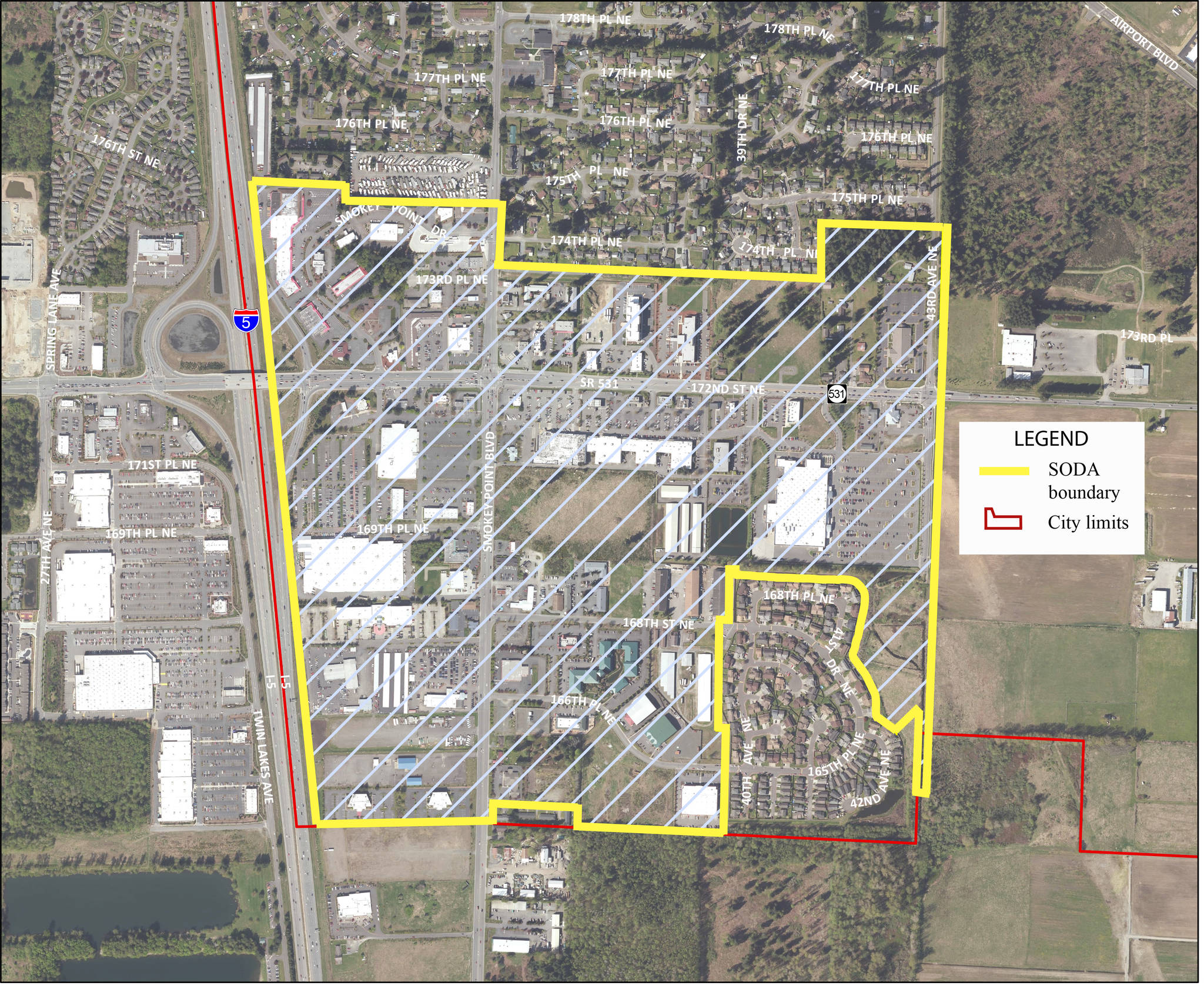ARLINGTON – The Arlington City Council approved a Stay Out of Designated (Drug) Area law Monday aimed at keeping repeat offenders out of the Smokey Point business district.
The law defines boundaries for the SODA area that takes in the business and retail district, which has growingly become a magnet for heroin and opioid abuse and other drug-related activity based on statistical data and complaints from local businesses and residents. The law takes effect Aug. 12.
Under the law, a defendant charged or convicted on drug offenses can be barred for two years under a court order issued by municipal judges to stay away from the drug-prone area. If they violate it, police can arrest them.
“I don’t think this is the magic bullet that’s going to cure all our problems,” Police Chief Jonathan Ventura said. “I’m just looking for additional tools for officers to use.”
The Smokey Point “stay out” zone is from I-5 east to 43rd Avenue NE, and from Smokey Point Drive and the 17300 block south to 168th Street NE.
“The retail corridor located within the Smokey Point neighborhood community has the highest concentration of illicit drug activity,” Ventura said.
Typical drug crimes range from possession of paraphernalia to trafficking, manufacturing and selling drugs to minors.
From 2012-16, drug-related incidents rose from 448 to 842 calls, an 88 percent increase. Heroin and opioid substance abuse has been a recurring theme on calls, consistent with the epidemic sweeping the nation.
Through May of this year, Arlington police responded to 318 drug-related incidents.
City Council Member Marilyn Oertle asked whether the designated area on just the business district would push drug trafficking into neighborhoods.
Ventura said while drug activity can happen anywhere, neighborhoods don’t have the draw.
“For high-traffic areas like Smokey Point, drug offenders choose to use that area particularly because it’s high visibility, it’s high traffic – people can get in and get out really quick,” due in part to the proximity to I-5.“They aren’t going to get the traffic in a residential area, so they’ll have to find somewhere else,” he said.
Council Member Debora Nelson was in the Smokey Point neighborhood for National Night Out. Among other public safety topics, she gained instant feedback from some 50 citizens whose homes are near the SODA boundaries.
“When asking them about when they feel safe and when they don’t, it really is about the drug interaction that they see and are noticing, and not so much the violent crime,” Nelson said, adding they were happy that the SODA law would give police an additional tool to curb drug crimes.
Council Member Mike Hopson asked whether similar SODA ordinance, such as in Everett and Marysville, have withstood legal challenges in court.
City Attorney Steve Peiffle said that “although ACLU has taken a public position that SODA ordinances are not fully effective as a law enforcement tool, I don’t believe they have challenged them legally for the reason that courts have supported them as a viable and legal tool.”
Once you designate an area, you can expand or contract it. If you see improvement in an area, you can collapse that area.
Ventura said court orders make a SODA law unique.Penalties for reentering the area after violating a court order could range from a day in jail, additional sanctions and community service, whatever a judge chooses, Ventura said.“Judges tend to get a little frustrated with people that are violating their orders,” he said.
Aside from arrests, Ventura said he hopes that the initiative ties into future plans to have an embedded social worker work with police on the street to get people into drug rehabilitation programs.
City officials said SODAs can be established in other high drug crime areas as well. It will take some time for the orders to be issued and word to get out, Ventura added.
Everett first designated a SODA area in 2007 and now has nine designated areas. Marysville designated a large portion of its downtown as a SODA zone in 2012. Marysville expanded the area in 2017 to include areas adjacent to the Snohomish River waterfront area. Other Washington jurisdictions that have adopted SODA regulations include Seattle, Tacoma, Fife, Shoreline, Bothell, University Place, Burien and SeaTac.



